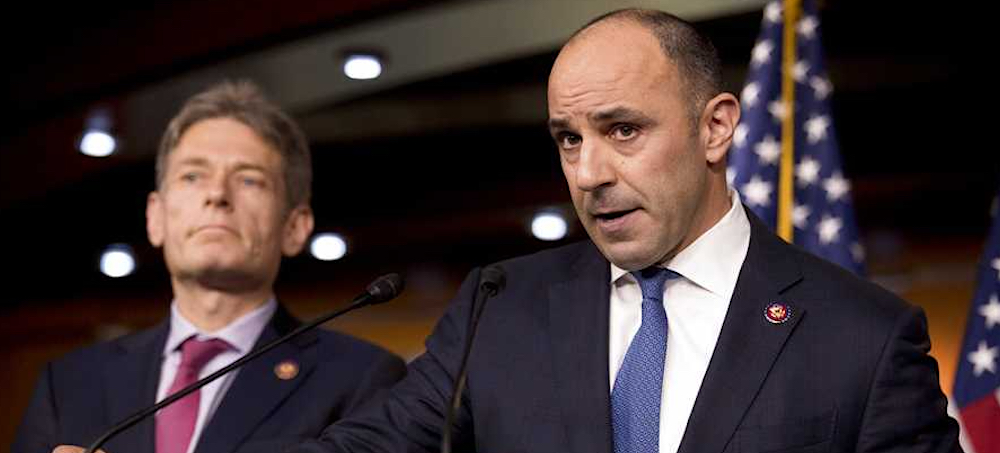Live on the homepage now!
Reader Supported News
Rep. Ruben Gallego (D-AZ) charged in the wake of the revelation that Jim Jordan is a traitor. Is that true?
Jordan’s office said that the sentence was truncated and that it was a forward on January 5 by Jordan to Meadows from former Defense Department Inspector General Joseph Schmitz, who also served as an executive with the rogue mercenary company Blackwater. Blackwater was expelled from Iraq for committing massacres with indiscriminate fire.
According to Ryan Nobles and Zachary Cohen at CNN, the full text that Jordan forwarded on Jan. 5 said,
“On January 6, 2021, Vice President Mike Pence, as President of the Senate, should call out all electoral votes that he believes are unconstitutional as no electoral votes at all — in accordance with guidance from founding father Alexander Hamilton and judicial precedence. ‘No legislative act,’ wrote Alexander Hamilton in Federalist No. 78, ‘contrary to the Constitution, can be valid.’ The court in Hubbard v. Lowe reinforced this truth: ‘That an unconstitutional statute is not a law at all is a proposition no longer open to discussion.’ 226 F. 135, 137 (SDNY 1915), appeal dismissed, 242 U.S. 654 (1916). Following this rationale, an unconstitutionally appointed elector, like an unconstitutionally enacted statute, is no elector at all.’”
Despite the citation of the Federal Papers and court decisions, this text is actually just a crackpot theory with no legal basis whatsoever, implying that Vice President Pence could have refused to certify President Biden’s election. He had no such prerogative.
As Jane C. Timm at NBC writes,
- “The law governing the certification process, the Electoral Count Act of 1887, specifically limits the power of the president of the Senate precisely because a president of the Senate had intervened in the count previously. In 1857, after James Buchanan’s win, the Senate president overruled an objection against Wisconsin electors who had been delayed in their certification process by a snowstorm in 1856.
“One of the points of the Electoral Count Act is to constrain the vice president given this earlier episode and make it clear that he’s a presider, not a decider,” said former Federal Election Commission Chairman Trevor Potter, president of the Campaign Legal Center.”
The 1887 law allows members of the Senate and the House of Representatives to raise objections to votes, but gives no such role to the president of the Senate (i.e. the vice president), who merely certifies the vote of the legislators.
So the text by Schmitz, a Trump campaign adviser, is horse manure.
Did Jordan’s forwarding to Meadows constitute, though, an act of treason?
Article III, Section 3, Clause 1 of the Constitution says, “Treason against the United States, shall consist only in levying War against them, or in adhering to their Enemies, giving them Aid and Comfort. No Person shall be convicted of Treason unless on the testimony of two Witnesses to the same overt Act, or on Confession in open Court.”
I don’t think treason is the right category here. I think the January 6 uprising was a form of sedition.
The US Federal Code has this to say,
- ” 18 U.S. Code § 2383 – Rebellion or insurrection: “Whoever incites, sets on foot, assists, or engages in any rebellion or insurrection against the authority of the United States or the laws thereof, or gives aid or comfort thereto, shall be fined under this title or imprisoned not more than ten years, or both; and shall be incapable of holding any office under the United States”
- (June 25, 1948, ch. 645, 62 Stat. 808; Pub. L. 103–322, title XXXIII, § 330016(1)(L), Sept. 13, 1994, 108 Stat. 2147.)
We don’t have enough evidence yet to conclude that Jim Jordan gave “aid or comfort” to the Capitol rioters who were attempting to rebel against the laws of the United States. It seems entirely possible that he, and several other members of Congress, as well as Donald Trump, were in close contact with members of Oath Keepers and other far right militias who spearheaded the Jan. 6 attack. We do not know that for certain, however. Anyone who cheered on the invasion of the Capitol with an eye to preventing Congress from certifying Biden’s win would likely be guilty of rebellion or insurrection.
Seditious conspiracy, another possible charge, urges the use of force to overthrow the government. The text that Jordan forwarded does not mention anything about force. It proposes a (phony) legislative procedure.
Likewise, 18 U.S. Code § 2385 forbids advocating the overthrow of the US government by force.
As I have pointed out, in the 1950s members of the US Communist Party were in fact jailed merely on the imputation to them of a desire to overthrow the US government, with no evidence that they plotted to do any such thing or that they had advocated violence. In 1957 the Supreme Court finally ruled that you couldn’t be locked up for advocacy, only for actual violence.
The McCarthy-era persecution of leftists used the 1940 Smith Act, passed in the shadow of WW II, which threatened with condign punishment those who:
- “knowingly or willfully advocate, abet, advise or teach the duty, necessity, desirability or propriety of overthrowing the Government of the United States or of any State by force or violence, or for anyone to organize any association which teaches, advises or encourages such an overthrow, or for anyone to become a member of or to affiliate with any such association.”
The Smith Act is still on the books. I don’t think it should be used against Jim Jordan. But I would say that he is much more guilty of contravening it than the Seattle Seven Communist Party members ever were.
So, no. Jim Jordan is not a traitor. And unless we discover that he advocated the violence deployed by the Capitol insurrectionists, he probably couldn’t be convicted even of sedition, conspiracy sedition, or advocating the overthrow of the government.
Glenn Kirschner, a legal adviser to NBC who teaches at George Washington University, suggested that what Jordan did was a violation of federal code 1505, which forbids obstructing pending acts of Congress.
The code says,
- “Section 1505 of Title 18, United States Code, as amended by the Victim and Witness Protection Act of 1982, forbids anyone from corruptly, or by threats of force or by any threatening communication, influencing, obstructing, or impeding any pending proceeding before a department or agency of the United States, or Congress. In 1996 Congress enacted a clarifying amendment to 18 U.S.C. § 1515, which defines the term “corruptly” as used in section 1505 to mean “acting with an improper purpose, personally or by influencing another, including making a false or misleading statement, or withholding, concealing, altering, or destroying a document or other information.” False Statements Accountability Act of 1996, Pub. L. No. 104-292, §3, 110 Stat. 3459, 3460.”
The message from Schmitz that Jordan forwarded was false and misleading, and he sent it with the purpose of obstructing the Congress from certifying the election. So maybe Kirschner has a point.
We know that Jordan talked with Trump on January 6. If we ever find out what he said, it could be a basis for a charge of conspiracy sedition.
 Trump supporters stand on a Capitol Police armored vehicle as others take over the steps of the Capitol on Jan. 6, 2021. (photo: Bill Clark/CQ-Roll Call/Getty Images)
Trump supporters stand on a Capitol Police armored vehicle as others take over the steps of the Capitol on Jan. 6, 2021. (photo: Bill Clark/CQ-Roll Call/Getty Images)
In short: We are chilled to our bones at the thought of a coup succeeding next time.
One of our military’s strengths is that it draws from our diverse population. It is a collection of individuals, all with different beliefs and backgrounds. But without constant maintenance, the potential for a military breakdown mirroring societal or political breakdown is very real.
The signs of potential turmoil in our armed forces are there. On Jan. 6, a disturbing number of veterans and active-duty members of the military took part in the attack on the Capitol. More than 1 in 10 of those charged in the attacks had a service record. A group of 124 retired military officials, under the name “Flag Officers 4 America,” released a letter echoing Donald Trump’s false attacks on the legitimacy of our elections.
Recently, and perhaps more worrying, Brig. Gen. Thomas Mancino, the commanding general of the Oklahoma National Guard, refused an order from President Biden mandating that all National Guard members be vaccinated against the coronavirus. Mancino claimed that while the Oklahoma Guard is not federally mobilized, his commander in chief is the Republican governor of the state, not the president.
The potential for a total breakdown of the chain of command along partisan lines — from the top of the chain to squad level — is significant should another insurrection occur. The idea of rogue units organizing among themselves to support the “rightful” commander in chief cannot be dismissed.
Imagine competing commanders in chief — a newly reelected Biden giving orders, versus Trump (or another Trumpian figure) issuing orders as the head of a shadow government. Worse, imagine politicians at the state and federal levels illegally installing a losing candidate as president.
All service members take an oath to protect the U.S. Constitution. But in a contested election, with loyalties split, some might follow orders from the rightful commander in chief, while others might follow the Trumpian loser. Arms might not be secured depending on who was overseeing them. Under such a scenario, it is not outlandish to say a military breakdown could lead to civil war.
In this context, with our military hobbled and divided, U.S. security would be crippled. Any one of our enemies could take advantage by launching an all-out assault on our assets or our allies.
The lack of military preparedness for the aftermath of the 2020 election was striking and worrying. Trump’s acting defense secretary, Christopher C. Miller, testified that he deliberately withheld military protection of the Capitol before Jan. 6. Army Gen. Mark A. Milley, the chairman of the Joint Chiefs of Staff, reportedly scrambled to ensure the nation’s nuclear defense chains were secure from illegal orders. It is evident the whole of our military was caught off-guard.
With the country still as divided as ever, we must take steps to prepare for the worst.
First, everything must be done to prevent another insurrection. Not a single leader who inspired it has been held to account. Our elected officials and those who enforce the law — including the Justice Department, the House select committee and the whole of Congress — must show more urgency.
But the military cannot wait for elected officials to act. The Pentagon should immediately order a civics review for all members — uniformed and civilian — on the Constitution and electoral integrity. There must also be a review of the laws of war and how to identify and deal with illegal orders. And it must reinforce “unity of command” to make perfectly clear to every member of the Defense Department whom they answer to. No service member should say they didn’t understand whom to take orders from during a worst-case scenario.
In addition, all military branches must undertake more intensive intelligence work at all installations. The goal should be to identify, isolate and remove potential mutineers; guard against efforts by propagandists who use misinformation to subvert the chain of command; and understand how that and other misinformation spreads across the ranks after it is introduced by propagandists.
Finally, the Defense Department should war-game the next potential post-election insurrection or coup attempt to identify weak spots. It must then conduct a top-down debrief of its findings and begin putting in place safeguards to prevent breakdowns not just in the military, but also in any agency that works hand in hand with the military.
The military and lawmakers have been gifted hindsight to prevent another insurrection from happening in 2024 — but they will succeed only if they take decisive action now.
 Rep. Jimmy Panetta, D-CA, was named in the RootsAction report. (photo: Andrew Harnik)
Rep. Jimmy Panetta, D-CA, was named in the RootsAction report. (photo: Andrew Harnik)
The report released by RootsAction.org, titled "Meet The PINOs: "Progressive In Name Only," targets Democratic Reps. Madeleine Dean (Pa.), Donald Norcross (N.J.), Jimmy Panetta (Calif.), Joseph Morelle (N.Y.), Lisa Blunt Rochester (Del.) and Brenda Lawrence (Mich.).
The label is reminiscent of the derisive "RINO" label, meaning "Republican in name only," sometimes applied to out-of-favor members of the GOP.
Norcross responded to the report on Thursday, listing off his own list of progressive accomplishments.
“As a life-long union member, I wake up every day fighting for working families. I was elected by members of the Congressional Progressive Caucus as vice-chair of labor. And I proudly support the American Rescue Plan and the Build Back Better Act, which is the largest expansion of health care in over a decade and makes child care affordable for working families nationwide," Norcross told The Hill. "Additionally, I support expansion of clean energy programs that create green jobs with strong labor protections. I was among the first supporters of increasing the federal minimum wage. If that’s not progressive, I don’t know what is.”
The Hill has reached out to all the lawmakers highlighted in the report.
The group accused the six lawmakers named in the report of often acting "more like corporate centrists" on issues like "Medicare for All and the Green New Deal, cutting military spending, [and] robust civil liberties."
"Our research shows that many caucus members don’t actually legislate like progressives," said Christopher Cook, the report's author.
The report marks the first time a major progressive coalition has publicly gone after members of the Congressional Progressive Caucus. Additionally, the report comes less than a year before the 2022 midterm elections, when progressives are expected to participate in a number of Democratic primaries. The report calls on progressives to primary the lawmakers in question.
“How can we achieve these critical reforms when some so-called ‘progressives’ refuse to challenge the status quo? Some of these folks in strongly Democratic districts seem ripe for a serious progressive primary challenge, if not this coming year then certainly in 2024," Cook wrote.
A number of Congressional Progressive Caucus members, including chair Pramila Jayapal (D-Wash.), recently flexed the group's muscles by delaying a vote on President Biden's infrastructure bill because the legislation was originally supposed to pass alongside the massive Build Back Better social spending legislation. But leaders ultimately angered some of their own when they made a deal to vote on infrastructure first. The House later passed the Build Back Better spending bill, but it is now stalled in the Senate.
 A U.S. Border Patrol agent instructs asylum-seeking migrants as they line up along the border wall after crossing the Rio Grande river into the United States from Mexico on a raft, in Penitas, Texas. (photo: Adrees Latif/Reuters)
A U.S. Border Patrol agent instructs asylum-seeking migrants as they line up along the border wall after crossing the Rio Grande river into the United States from Mexico on a raft, in Penitas, Texas. (photo: Adrees Latif/Reuters)
At least nine immigrants identified by attorneys as being vulnerable have been taken out of the program, however, one was mistakenly returned to Mexico.
As the Biden administration prepared to reimplement the Migrant Protection Protocols (MPP), which forced more than 71,000 immigrants to wait in Mexico, often in dangerous conditions, officials said they were working to restart it in a way that protect with known physical and mental conditions, as well as others who might be at increased risk of harm in Mexico due to their sexual orientation or gender identity.
However, some immigrants who attorneys argue fall under those categories have been placed in MPP, also known as “Remain in Mexico,” since the first people were sent back to Mexico on Dec. 8. So far, lawyers have identified 12 members of the LGBTQ community and 16 cases of medical conditions they argue should have exempted the immigrants and asylum-seekers. (There was some overlap with four of the LGBTQ immigrants also having medical conditions.)
The email from the Border Project, a pro bono endeavor to provide legal aid to immigrants operated by the Jones Day international law firm, was sent to legal service providers and details some of the concerns they had with the recently relaunched MPP. The Border Project had agreed to provide legal services at the El Paso Central Processing Center on a short-term basis after the Biden administration, under a federal court order, restarted the program, which included setting up a hotline for immigrants.
The Border Project said it identified at least 24 immigrants who should've been excluded from MPP and had escalated their cases to Customs and Border Protection (CBP), including one man who was raped and threatened with death in Mexico after men learned that he and his partner were gay.
Attorneys also spoke with immigrants with health conditions they said should have kept them out of Remain in Mexico, such as cancer, HIV, and a recent amputation. The man had parts of his fingers amputated by the cartel in a video call with family to extort money from them, the email states.
At least nine of the 24 were taken out of MPP after the Border Project and its partners contacted CBP about their cases and they are waiting for the results from the rest, the email adds. However, at least one immigrant who was taken out of MPP after attorneys identified him was still returned to Mexico.
"CBP reported that they are working to locate him in Mexico and to bring him into the US," the email states.
The Department of Homeland Security (DHS) said in a statement that particularly vulnerable immigrants, including those with physical and mental health challenges, the elderly, and those at risk of discrimination because of their LGBTQ status, will be exempted from MPP on a case-by-case basis.
The first vulnerability assessment is made at initial processing, the agency said. However, the DHS acknowledged that circumstances can change and immigrants who may not have been vulnerable when they were placed in MPP can become so at a later date. Consequently, an immigrant's vulnerability can be considered at each point of the process and the DHS said it encourages people who believe that their circumstances have changed to make CBP personnel aware.
Guidance on the re-implementation of MPP issued by the DHS said the following groups of immigrants should not be placed in the program: Immigrants with known mental or physical health issues, including a disability or a medical condition related to pregnancy; those with particular vulnerabilities given their advanced age; and people who face increased risk of harm in Mexico due their sexual orientation or gender identity.
Lisa Koop, associate director of legal services at the National Immigrant Justice Center, has been working with immigrants placed in the Remain in Mexico program to provide legal aid and identify those who might be classified as vulnerable. One man had a traumatic brain injury and another has cancer and needs treatment, Koop said.
"By the government's own terms these categories of people are not supposed to be placed in MPP," Koop said. "Yet we're seeing an alarming number of people who meet those categories who are still being enrolled in MPP."
Lawyers have been working to raise the alarm on these cases with CBP, Koop said. Immigrants have told Koop that US border officers aren't asking probing questions about their health, their sexual orientation, or gender identity.
Sending vulnerable immigrants back to Mexico under MPP was also an issue during the first iteration under the Trump administration. According to guiding principles for the policy, immigrants with “known physical/mental health issues” were prohibited from being placed in the program. Nevertheless, a report obtained by BuzzFeed found that this was not well explained to border agents and that immigrants were still returned to Mexico despite having medical issues.
Those sent back during the Trump administration included a 6-year-old Honduran girl described as having “crippled” legs, according to an internal government report obtained by BuzzFeed News that was addressed to senior DHS leaders. An 11-year-old boy with severe epilepsy and convulsions that prompted vomiting and memory loss, a Honduran woman who cannot hear or speak, and a woman with a serious precancerous disease were also caught up in MPP.
It can be a difficult process to get out of MPP even if attorneys accompany immigrants to official border crossings to ask CBP officers to have them taken out of the program. Adults and children can also spend hours on international bridges even as temperatures drop during the winter to plead their case.
President Joe Biden had made good on a campaign promise to undo MPP and even allowed some immigrants to enter the US to continue their case. But earlier this month, he was forced to bring back Remain in Mexico in order to comply with a federal court order when a judge determined that the administration erred in the way it had rolled back the policy.
The first two immigrants were returned from El Paso, Texas, to the Mexican city of Ciudad Juarez on Dec. 8.
The process for placing people in MPP may get better as time goes by, Koop said, but if the administration wasn't ready to have safeguards in place for vulnerable immigrants they should have delayed reimplementing the policy.
"The courts required them to make a good faith effort," Koop said. "It didn't require them to barrel ahead before they had safety measures in place."
In addition to the health issues, Border Project attorneys also said they were concerned about men being separated from their wives or adult children. One immigrant reported being separated from his wife, who was six months pregnant, epileptic, and asthmatic. His wife was allowed to enter the US and he was placed into MPP. Another immigrant was separated from his wife who has a heart condition while another was deaf.
The email from the Border Project said it highlighted the issues attorneys saw with the understanding that many in the administration had worked "tirelessly" to provide legal services to immigrants enrolled in MPP and in CBP custody.
"We have no doubt that these efforts — and other attempts to inject the rule of law into MPP — have been undertaken with the best intentions by people who care passionately about access to justice," the email states. "We have also encountered good intentions by some CBP officials."
One CBP officer at the El Paso Central Processing Center identified immigrants and reached out to attorneys on her own accord, the group said. Others at CBP worked to fix technological issues with the phone lines and help the Border Project identify immigrants who provided incomplete information in the hotline voicemails, they added.
 Since the early 2000s, Purdue Pharma faced countless lawsuits for misleading advertisements and distribution of opioid medications, namely Oxycontin. (image: Chicago Monitor)
Since the early 2000s, Purdue Pharma faced countless lawsuits for misleading advertisements and distribution of opioid medications, namely Oxycontin. (image: Chicago Monitor)
In a ruling Thursday, U.S. District Judge Colleen McMahon in New York found that federal bankruptcy law does not give the bankruptcy judge who had accepted the plan the authority to grant that kind of release for people who are not declaring bankruptcy themselves.
The ruling is likely to be appealed by the company, family members and the thousands of government entities that support the plan.
A Purdue spokesperson said Thursday evening that the company was preparing a statement. Representatives of the two branches of the family who own the company did not immediately respond to a request for comment.
Connecticut Attorney General William Tong, who was among a handful of state officials seeking to have the deal undone, called the ruling "a seismic victory for justice and accountability." Tong said the ruling will "re-open the deeply flawed Purdue bankruptcy and force the Sackler family to confront the pain and devastation they have caused."
Purdue sought bankruptcy protection in 2019 as it faced thousands of lawsuits claiming the company pushed doctors to prescribe OxyContin, helping spark an opioid crisis that has been linked to more than 500,000 deaths in the U.S. over the last two decades.
Through the bankruptcy court, it worked out a deal with its creditors. Members of the Sackler family would give up ownership of the company, which would transform into a different kind of entity that would still sell opioids — but with profits being used to fight the crisis. It would also develop new anti-addiction and anti-overdose drugs and provide them at little or no cost.
Sackler family members also would contribute $4.5 billion in cash and charitable assets as part of an overall deal that could be worth $10 billion, including the value of the new drugs, if they're brought to market.
Government entities and businesses agreed to use any money they receive fighting the opioid epidemic. The deal also calls for millions of company documents, including communications with lawyers, to be made public.
In return, members of the wealthy family would get protection from lawsuits over their role in the opioid crisis — both the 860 already filed and any others in the future.
Most state and local governments, Native American tribes, individual opioid victims and others who voted said the plan worked out in the bankruptcy court should be accepted.
But the U.S. Bankruptcy Trustee's office, eight state attorneys general and some other entities have been fighting the deal. They argue that it does not properly hold members of the Sackler family accountable and that it usurps states' ability to try to do so.
A bankruptcy court judge approved the plan over the objections in September. But the opponents appealed to McMahon's court.
The main issue on the appeal was the lawfulness of the measures that would extend legal protections to family members.
Such "third-party releases" are not used in most bankruptcy cases, but they are common in cases such as Purdue's, in which the companies involved are burdened with lawsuits and have relatively little value — but their wealthy owners could contribute.
The Purdue deal would not protect family members from any criminal charges. But so far none have been filed, and there are no signs that any are forthcoming, though some activists are calling for charges.
In a hearing, McMahon focused in on how Sackler family members transferred $10.4 billion from the privately held Stamford, Connecticut-based company over the decade before the bankruptcy. McMahon wanted to know whether the money was moved in part to ensure a role for the Sacklers in bankruptcy negotiations.
But in her ruling Thursday, McMahon focused on whether the bankruptcy law allows releases for third parties when some creditors in the bankruptcy disagree. She also noted that other courts will weigh in on the case.
"This opinion will not be the last word on the subject, nor should it be. This issue has hovered over bankruptcy law for thirty-five years," she said.
 Rai took many by surprise - strengthening to immense power in the final hours of its approach towards the country. (photo: BBC)
Rai took many by surprise - strengthening to immense power in the final hours of its approach towards the country. (photo: BBC)
More than 30 people are feared dead and many are missing after a devastating storm swept over the Philippines.
The strongest storm to hit the Philippines this year has toppled power poles, uprooted trees and left three million people without electricity.
The country's disaster agency says the reported death toll stands at 31.
Four people are confirmed killed and 27 are believed to have died, it said in a statement.
Rescue operations are now under way in the devastated regions.
There are growing concerns for the holiday island of Siargao, where the storm - also known as Typhoon Odette in the Philippines - first made landfall. Its governor said the island was "totally devastated" and estimated repair costs would be more than $400m (£302m).
And the governor of the neighbouring Dinagat islands, Arlene Bag-ao, said the region had been "levelled to the ground" by the typhoon.
"The fields and boats of our farmers and fisherfolk have been decimated," she said in a Facebook message quoted by news site Rappler. "[W]e have lost our homes. Walls and roofs were torn and blown off…. We have a dwindling supply of food and water. Electricity and telecommunications are down. This is why we urgently and humbly ask for everyone's help."
She said the damage "is reminiscent of, if not worse than, when Yolanda hit our province". More than 6,000 people died after that storm - also known as Typhoon Haiyan - hit the country in 2013.
On average about 20 storms and typhoons strike the Philippines each year.
The storm comes as the nation prepares for Christmas, a major holiday in the Philippines. More than 80% of the population declare themselves to be Catholic.
The latest update from the Philippine Atmospheric Geophysical and Astronomical Services Administration (Pagasa) said that while Typhoon Rai has now passed west of the island nation, it is intensifying again.
Current predictions suggest it will head towards Vietnam before turning north towards China, Pagasa said.
Typhoon Rai is the most powerful storm to hit the Philippines this year.
What makes this storm so significant is the power it sustained as it moved across nine different land masses in the Southern Philippines.
Island after island, from Siargao to Palawan - a distance of more than 800km (500 miles) - was battered by relentless winds and exceptionally heavy rainfall.
Charities here have been quick to link the storm's ferocity to global warming.
Greenpeace Philippines warned that "as the climate crisis worsens… these typhoons will get worse, more unpredictable, and more destructive."
The Philippine Red Cross called Rai a "monster storm" and expressed concern that climate change is making typhoons "more ferocious".
Although not as strong as 2013's Super Typhoon Haiyan, which killed more than 6,000 people and devastated vast tracts of land in the Philippines, Rai took many by surprise - strengthening to immense power in the final hours of its approach towards the country.
 The Farallon Islands are home to what ecologists have called a 'plague-level infestation' of mice. (photo: Paul Broadbent/Alamy)
The Farallon Islands are home to what ecologists have called a 'plague-level infestation' of mice. (photo: Paul Broadbent/Alamy)
Wildlife officials and ecologists say urgent and drastic measures are needed to eradicate mice, a threat to island’s endemic species
After hours of impassioned debate, coastal commissioners voted 5-3 in favor of the long-controversial plan put forth by the US Fish and Wildlife Service (FWS). The approval comes despite the objections of local environmental activists who fear that rodenticide will kill not only the invasive mice, but also gulls and burrowing owls.
If the FWS regional director approves the plan as well, a poison drop over the islands, located just off the San Francisco coast, could take place by the fall of 2023, the wildlife agency said.
Wildlife officials and ecologists conducting research on the island have argued that urgent and drastic measures are needed to eradicate the mice, which are a threat to endemic species – including native arboreal salamanders, camel crickets and birds like the ashy storm petrel. Proponents of the plan have said using the rodenticide brodifacoum is the only way to quickly achieve total eradication of the mice, which were inadvertently introduced to the islands by sailors in the 19th century, and to protect native species that are projected to decline in the coming decades.
Supporters of the proposal also include conservation groups like the National Audubon Society and the Nature Conservancy.
However, during hours of emotional debate before the vote, opponents warned that FWS plans to minimize collateral damage to seabirds, raptors and other animals weren’t foolproof. The proposal details that FWS staff would begin by “hazing” gulls to ward them away from the islands before the rodenticide is deployed, using techniques including lasers, pyrotechnics and effigies. Burrowing owls and other raptors – who might eat poisoned mice and themselves get poisoned – would be gathered up and transported off the island.
Hungry raptors flying along California’s coast won’t be able to stay away from a feast of ailing, poisoned mice on the island, said Sara Wan of Western Alliance for Nature and will die of poisoning. “I cry at the thought,” she said. “If I sound angry to you it’s because I am.”
Follow us on facebook and twitter!
PO Box 2043 / Citrus Heights, CA 95611


